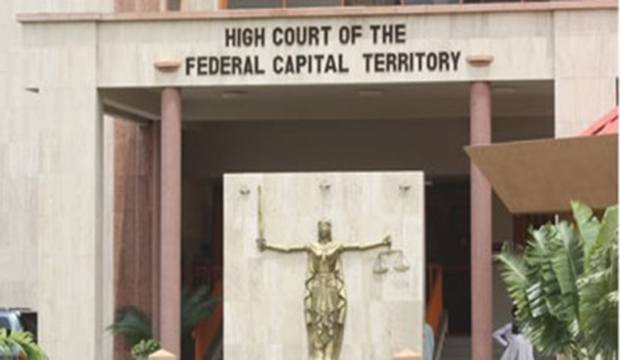A judge of the Federal High Court in Abuja Thursday withdrew from a suit the immediate past governor of Zamfara State, Abdulazeez Yari, filed to stop the Economic and Financial Crimes Commission, EFCC, from seizing some of his assets.
She is Justice Evelyn Maha who backed out of the case for an undisclosed reason.
At the resumed proceeding Thursday, Justice Maha, who is sitting as the vacation Judge, announced her decision to return the case-file to the court’s registry to enable the Chief Judge re-assign it to another Judge.
However, Justice Maha adjourned the matter till September 30 for possible hearing by a regular court.
The Attorney-General of the Federation and Minister of Justice, Mr. Abubakar Malami, SAN, had on August 30, challenged the jurisdiction of the court to shield the former governor from investigation and possible arrest by the anti-graft agency.
Malami told the court that Yari was being investigated on corruption allegations, even as he queried the legal competence of the suit he said was aimed to truncate the administration of justice.
His appearance followed a summon the court issued on August 27, which directed him to show cause why the EFCC should not be stopped from confiscating assets traced to the ex-governor.
Yari had in the suit marked FHC/ABJ/CS/948/2019, which he filed pursuant to section 46(1) and (3) of the 1999 constitution and Order 4 Rule 3 and 4 of the Fundamental Rights Enforcement Act, cited both the AGF and EFCC as respondents.
EFCC had before the adjournment, told the court that it filed additional counter-affidavit to oppose the suit.
The commission, through its lawyer, Mrs. Hussaina Gambo, maintained that section 6 and 7 of the Act that established it, empowered it to seize assets suspected to have been acquired through proceeds of crime.
The AGF had in his own counter-affidavit, told the court that assets EFCC wanted to seize from the ex-governor were suspected to have been acquired through illegal proceeds.
He argued that the anti-graft agency had the statutory powers to arrest and detain anybody alleged to have committed a crime.
The AGF argued that Yari’s right to personal liberty as guaranteed under the 1999 Constitution, as amended, was not absolute.
In the affidavit deposed to by Zekeri Friday, a litigation officer at the Federal Ministry of Justice, the AGF urged the court not to interfere with statutory and constitutional duties of the EFCC to ensure the prevention of crimes and maintenance of law and order.
“That by the relevant laws, the Applicant’s right to personal liberty or owning property can be curtailed upon reasonable suspicion of his having committed an offence in owning the property.
“That the President, Federal Republic of Nigeria, after considering the fact that corruption constitutes an unusual and extra-ordinary threat to the well-being, national security and stability of Nigeria’s political and economic systems, as well as its continuous existence; and the need to effectively address same, acting pursuant to section 5 and 15 of the 1999 Constitution, issued an Order titled, “Executive Order No. 6 of 2018 on the Preservation of Suspicious Assets Connected with Corruption and other Related Offences.
“That the said Order is meant to abolish all corrupt practices and abuse of power by employing, all legal mechanisms to restrict dealings in suspicious assets subject to corruption related investigation and inquiries in order to preserve same in accordance with the rule of law while safeguarding the fundamental rights of citizens.
“That if this Honourable Court grants the relief of the Applicant, the doors of corruption will thrive and consequently put the corporate existence of Nigeria in jeopardy,” the AGF added.
Yari had in the suit he filed through his lawyer, Mr. Abubakar Magaji, SAN, accused EFCC of “persecuting” him and members of his family over the turnout of political events in Zamfara State that made the ruling All Progressives Congress, APC, lose all elective positions in the state to the Peoples Democratic Party, PDP, owing to judgement of the Supreme Court.
According to him, “after the decision of the Supreme Court, some aggrieved individuals who are very powerful, decided to use agents of the 1st and 2nd respondents against the applicant.
“These individuals thus decided to carry out a vendetta and revenge against the applicant, including instigating the respondents against the applicant upon their spurious conclusion without evidence that he was guilty of corrupt practices as former governor of Zamfara State and was in breach of the Code of Conduct Act”.
He told the court that the witch-hunt against him was politically motivated, saying it was targeted to discredit and humiliate him in a bid to decimate him politically.
The ex-governor decried that action of the EFCC made it impossible for him to exercise his right or his freedom of movement without fear of being arrested and intimidated.
Yari claimed that he fully declared all his assets in accordance with the Code of Conduct for public officers prior to his assumption of office as a governor, adding that he did not commit any offence to warrant the threat of seizure of assets he said were acquired before he became governor.
The ex-governor said he was afraid that the agency could move against him, despite the pendency of his case before the court.
He, therefore, applied for, among others, “An order of interim injunction restraining the respondents from seizing, impounding, taking over, confiscating or otherwise forfeiting his assets and properties wherever they may be located within Nigeria or anywhere in the world, pending the hearing and determination of the motion on notice.”

